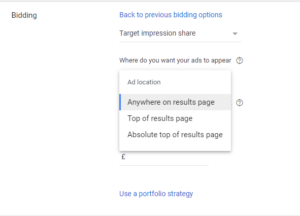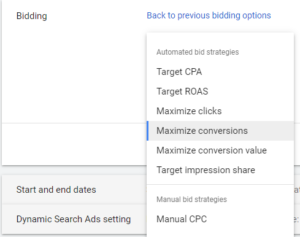Choosing the right bidding strategies for Google Ads
There are many bidding strategies you can use for your Google Ads campaigns. Whether it’s manual CPC or a fully automated bidding strategy, there are many to choose from and each one will help you achieve a specific goal.
At Goldstar, we have been testing a few strategies and are currently using Maximise Conversions.
Manual CPC
Manual bidding is the simplest and best place to start if you’re new to Google Ads and have time to review the bids regularly. The bids are set at keyword level and they only change when a user changes them.
It can be time consuming as it takes time to decide if a keyword needs a higher or lower bid. There are also many metrics that Google uses when you set an automated bidding strategy that you don’t see so you could be making uninformed decisions.
Enhanced CPC
It is like manual CPC, but Google has the power to adjust the bids. This can be an increase or decrease to any amount and Google will gauge this depending on the likelihood the click will lead to a conversion.
There use to be a 30% cap on the amount Google could increase or decrease the bids by but since this has been removed there is the risk that CPC’s (cost per click) could be really high which may not work or be very profitable for your account.

Maximise Conversions
This is a fully automated bidding strategy which means it is not keyword based bidding. Instead you can set your daily budget at campaign level. Google has control over your budget. You still have control in that you set a daily budget and choosing maximise conversions means you’ve set a goal. Google will try to get as many conversions for your daily budget.
To use this strategy, you must make sure you have conversion tracking setup properly in your Google Ads account. If you don’t this could end very badly. As this goal is based on conversions, there is a risk that the CPC could be way higher than you would like, and you need to check if this is something that works with your business. Google will also spend your whole daily budget so make sure you don’t set it any higher than what works for you.
Target CPA
This automated bidding strategy, target CPA (cost per acquisition) is based on what you set as a target cost per conversion. This is great when you want to ensure profitability for each conversion. Google will spend the daily budget to get as many conversions at the set CPA as it can. There may be a few conversions slightly above or slightly below, but Google’s goal is to get this balanced in the long run. You can set a maximum and minimum bid to keep some level of control if you wish.
I would not recommend setting this up until you have enough conversion data. Google will make decisions based on past data so the more you have, the better informed Google will be. You can set your daily budget at campaign level. The recommendation from Google is 15 conversions in the last 30 days. It is a good idea to set ‘easy’ targets in the first month and use it as a testing phase. This way Google can learn what works and over time, you can set better targets as Google will feel more confident and know your account better.
Target ROAS
Target ROAS (return on ad spend) is like target CPA, but this is based on ad spend. Google will adjust the bids for conversions and predict future conversions based on past data. You can also set bid limits, but Google is against this as it can limit their powers.
Much like target CPA, start with an easier goal to give Google time to learn and improve your target over time.
Maximise Clicks
Setting a goal of maximise clicks means google will try to get as many clicks as possible for your daily budget. This is a great bidding strategy if you’re trying to raise brand awareness and get people onto your site. You can set a maximum CPC if you want to keep some level of control over how your budget is spent.
Ensure you keep an eye on your CPC as Google will spend all your daily budget irrelevant of how much clicks cost so it is a good idea to set a maximum CPC. Also just be aware that this will bring people to your sight but may not all lead to conversions. If you have a goal of more leads/sales, this is not the right strategy for you.
Target Impression Share
Target impression share is the percentage of impressions your ads get compared to the amount they could get. You can set one of three ways you’d want your ads to appear:
- Absolute top of page- this means the first result at the top of the first page
- Top of page- amongst the top (there are usually 3 ads at the top)
- Anywhere on the page. – anywhere on the results page

Google will adjust the bids to reach the goal you have chosen. You can also set a max CPC to make sure Google doesn’t overspend.
It is extremely unlikely that you will get 100% so if you set that as a goal but don’t get above 95% then don’t be too disheartened. It is a good idea to set a max CPC, so Google doesn’t spend too much for 1 click.
Where to go from here…
As you have now read, there are many bidding strategies to pick from. They are a great way to save time, but you may still be unsure on which one is right for you. The best thing to do is to start with an easy to control one, test it and go from there. It is also important to establish what our end goal is. If you’re starting up or looking for brand awareness, manual bidding or maximise clicks could be for you but if you’re a bit further ahead and have picked a goal whether it be maximise conversions or target ROAS, give it a go and keep an eye on it whilst it’s learning.

Google will also recommend a few strategies it thinks will be good for you based on your data, but you can select whichever you like. You also have the flexibility to try a few different ones as you can set these bidding strategies at Ad Group, Campaign or Account level so could use different ones for different campaigns if they have different goals.
